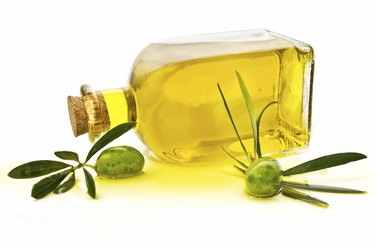
If you've had a cholecystectomy, or gallbladder removal, to treat gallstones or gallbladder dysfunction you are not alone. In fact, more than 500,000 people in the United States undergo this surgery each year, according to the Merck Manuals. You may have some digestive troubles after your surgery, even when consuming healthy fats like olive oil.
Significance
Video of the Day
Since fat such as olive oil doesn't dissolve in water, your body needs a special system for fat digestion and absorption. Your gallbladder is a key part of this system. Your liver secretes bile, and your gallbladder stores it until you need it. While storing bile, your gallbladder also concentrates the bile by removing water. Bile is necessary because it contains substances that emulsify fats and stimulates secretion of an enzyme that helps break down the fats. When you consume a fat like olive oil, this stimulates your gallbladder to contract and release bile into your intestine. With your gallbladder removed, bile still flows into your intestine from your liver. However, your fat digestion may become less efficient because your bile is not concentrated, according to the University of Pennsylvania.
Video of the Day
Dietary Guidelines
After a cholecystectomy, you do not have any dietary restrictions, such as reducing fat intake. However, you may have "phantom" pains after eating foods that contain olive oil or other fats. You feel this pain on the right side of your abdomen after eating the food. According to the Intermountain Medical Group in Salt Lake City, Utah, this pain usually diminishes over time. It should fade and gradually disappear over the first few months following your surgery. You might also have loose stools for several weeks. This is common and gradually improves with time for most people, according to Intermountain Medical.
Digestive Trouble
Some people suffer chronic diarrhea following gallbladder surgery. In rare cases, this can last for years, according to Michael F. Picco, a gastroenterologist writing for MayoClinic.com. Limiting foods that can cause diarrhea, such as those fried in olive oil or other greasy, high-fat foods, might help to reduce your diarrhea. Limiting dairy products, caffeine and sweets may help as well. However, the cause of diarrhea following gallbladder removal remains unclear. The cause may be an increase in bile entering your large intestine because this might have a laxative effect, notes Picco.
Treatment and Considerations
If you are having digestive problems when you consume olive oil and other fat after gallbladder surgery, there are steps you can take. The United Kingdom's Daily Mail newspaper recommends taking lecithin when you eat a fatty meal. Available at health food stores, lecithin helps your body emulsify fat. Taking a concentrated lipase enzyme after consuming a meal high in olive oil may help as well. Artichoke supplements sometimes help with digestion, too, because they increase bile production. Discuss using any supplement with your health care provider, and follow his guidance for proper dosage. Your provider also may recommend anti-diarrheal medications or a medication that impairs bile acid absorption such as aluminum hydroxide or cholestyramine, notes Picco.